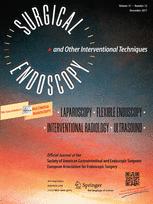Witteman BP, Kessing BF, Snijders G, Koek GH, Conchillo JM, Bouvy ND
Surg Endosc. 2013 Jun;27(6):2231-6.
BACKGROUND:
Transoral incisionless fundoplication (TIF), a novel endoscopic procedure for treating gastroesophageal reflux disease (GERD), currently is under evaluation. In case of treatment failure, subsequent revisional laparoscopic antireflux surgery (rLARS) may be required. This study aimed to evaluate the feasibility, safety, and outcomes of revisional antireflux surgery after previous endoscopic fundoplication.
METHODS:
Chronic GERD patients who underwent rLARS after a previous TIF procedure were included in the study. Pre- and postoperative assessment included GERD-related quality-of-life scores, proton pump inhibitor (PPI) usage, 24-h pH-metry, upper gastrointestinal endoscopy, and registration of adverse events.
RESULTS:
Revisional laparoscopic Nissen fundoplication was feasible for all 15 patients included in the study without conversions to open surgery. Acid exposure of the distal esophagus improved significantly after rLARS, and esophagitis, PPI usage, and hiatal hernia decreased. Quality of life did not improve significantly after rLARS, and 33 % of the patients experienced dysphagia.
CONCLUSION:
Revisional laparoscopic Nissen fundoplication was feasible and safe after unsuccessful endoscopic fundoplication, resulting in objective reflux control at the cost of a relatively high rate of dysphagia.
Link to abstract on PubMed: Witteman BP, et al; Surg Endosc. 2013 Jun; 27:2231-6.


